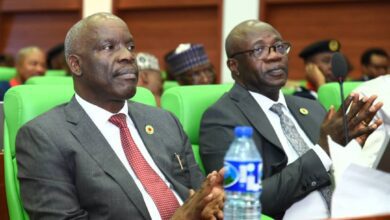Energy Transition: Stakeholders Urged To Develop Strategies To Tackle Emerging Challenges

Authority Chief Executive, Nigerian Midstream and Downstream Regulatory Authority (NMDPRA), Engr. Farouk Ahmed, has advised industry stakeholders to devise a set of strategies to confront emerging challenges posing risk to the achievement of net-zero carbon emissions target.
Nigeria is committed to reaching net-zero carbon emissions by 2060, thus, faces the risk of falling behind if it does not develop strategies to surmount the emerging challenges like renewable energy skills and others.
Engr. Ahmed, who stated this while delivering a keynote address at the rebranding of the Major Oil Marketers Association of Nigeria (MOMAN), submitted that the transition of MOMAN to Major Energies Marketers Association of Nigeria (MEMAN) will have several impacts on both employees and stakeholders.
Engr. Ahmed held that employees will now need to acquire new skills or knowledge as the member companies shift their focus towards renewable energy sources.
“Some job roles may change significantly, while others might be phased out. However, new roles are likely to be created in areas such as renewable energy technology, sustainability research, and environmental compliance,” he stated.
He hinted that the vision of the NMDPRA is to promote economic and social development through sustainable energy, adding, “from our perspective as the regulator of this sector, this transition from MOMAN to MEMAN is not just about changing the name or logo. It is about changing our mindset, our operations, and our impact on Nigeria and the world. It is about investing in renewable energy sources, reducing our carbon footprint, and promoting energy efficiency. It is about ensuring that businesses not only power Nigeria today, but also preserve Nigeria for tomorrow. This will entail you setting clear, measurable goals related to renewable energy production, carbon emissions, and energy efficiency that should regularly be tracked and reported on these metrics to us to ensure transparency and accountability.”
The NMDPRA chief noted that from the industry sustainability initiative, ensuring that transition is inclusive and equitable for all Nigerians is a key priority that NMDPRA will continue to emphasize.
“This includes actively engaging local communities, particularly those directly impacted by our operations. Their input and feedback will be crucial in shaping your transition strategy. Prioritizing hiring locally wherever possible and investing in education and training programs to equip Nigerians with the skills needed for jobs in the renewable energy sector should become a culture for your member companies. We are committed to ensuring that the transition to renewable energy does not lead to increased energy costs for Nigerians as you strive to reduce the environmental impact of your operations, particularly in communities that have been disproportionately affected by pollution,” Ahmed explained.
As the country embarks on the sustainability journey, Engr Ahmed admitted that the challenges that lie ahead are daunting, but was quick to point out that within the challenges lie identified opportunities that await the nation.
He said: “We are excited about the innovations we at NMDPRA are championing in the sustainability and energy transition space, and we are
happy that MOMAN is bringing some of them to fruition. We hope the partnerships we have forged up to this moment will amplify the difference we can make.”
While expressing hope that MOMAN’s transition to MEMAN will not hinder its members’ commitment to adhering to all relevant regulations and standards, Engr Ahmed said the regulatory body’s commitment is steadfast, promising to continue to work closely with MEMAN members to ensure operations are compliant and contribute positively to the environment.
To other stakeholders planning a similar corporate shift, Ahmed said: “You will witness changes too. While there may be short-term costs associated with the transition, many investors may view the shift towards sustainability as a positive move that future-proofs the companies against regulatory changes and market shifts. However, as the demand for clean energy grows, customers will view the transition as a positive step, and this will enhance their reputation and customer loyalty.”






